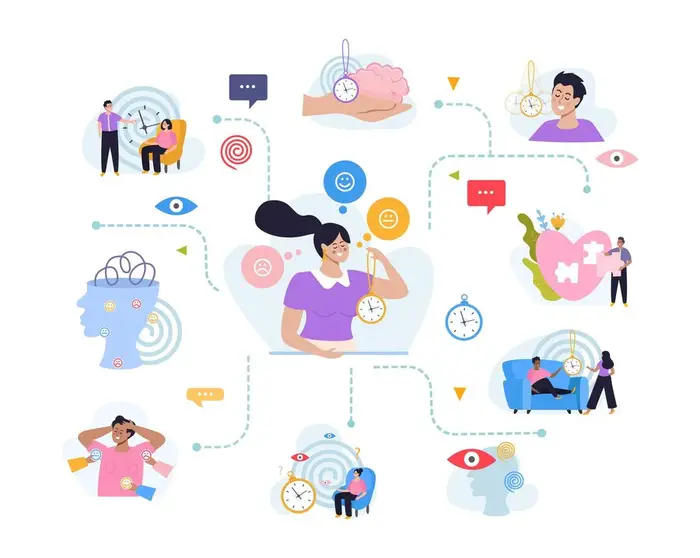Psychology can be a fulfilling subject to study both personally and professionally. Concentrations in counselling psychology provide a variety of chances to learn about individuals and their interactions with others on the job, in relationships, and when dealing with personal issues like health issues or money problems.
Choosing to major in psychology can be a significant and challenging decision with so many different kinds of psychology.
-
Abnormal Psychology
The study of abnormal patterns in behaviour, emotion, and thought is the focus of abnormal psychologists, who also examine mental disease causes and theories. They work in mental health assessment, diagnosis, and clinical therapy.
Most individuals associate aberrant behaviour with the extremes—unusual, startling instances with a sensational appeal.
Abnormal translates as “not normal.” What is considered normal and abnormal depends on various factors, including culture, religion, family history, and other social conventions.
Within the discipline of psychology, abnormal psychology is a speciality that draws from the study of normal psychology, regular adjustment, social interactions, group interactions, expected roles, personal maturity, and other related topics.
-
Biopsychology
This study focuses on the connection between biology and behaviour, mainly how the brain and neurotransmitters influence and regulate behaviour. Researchers in biopsychology are interested in how behavioural changes result from biological changes.
Although many bio psychologists work at public and commercial research facilities, knowledge of how the brain functions can lead to positions in politics, technology, marketing, and education, bio psychologists work with pharmaceutical companies to develop and test novel medications, as well as to treat patients in hospitals and clinics who have neurological system injury.
-
Social Psychology
Social psychologists investigate people’s thoughts feelings, and how other people’s actions affect them. They examine membership in groups, bias and discrimination, attitudes and persuasion, the effects of society on self-esteem, and other topics.
Your self-perception in connection to the outside world shapes your beliefs and behaviour, among other things. The opinions of others have an impact on behaviour and self-perception as well. Social psychologists are concerned with improving interpersonal relationships through psychology.
Owing to the social psychologist’s training, which blends scientific research techniques with human behaviour, there are various professional options and work environments. Numerous social psychologists hold positions in academic settings where they can oversee laboratories, teach, and carry out research.
-
Cognitive Psychology
Cognitive psychology examines the mental operations involved in thinking, memory, and language, and it gathers information on these operations by behaviour observation. According to APA, information processing theories created in computer science and artificial intelligence have been the focus of current research.
The best psychologists that are studying cognition and brain science work in academic environments where they might be researchers, teachers, or both. Their knowledge helps emerge fields, including organisational psychology, software development, human-computer interface, and as consultants in the commercial sector.
Numerous cognitive psychologists have direct patient and client interactions in clinical and private practice settings. Others work for the government, in private research institutes and treatment centres, or as courtroom expert witnesses.
Although the need for cognitive psychologists and brain scientists has changed, this discipline is expanding. There is anticipated to be a rise in demand for brain scientists and mental specialists due to the rapid advancement of technology and the lack of a solution for diseases like Alzheimer’s disease.
-
Developmental Psychology
Scientific knowledge is applied to education, child care, and policy through the study of developmental psychology. Developmental psychologists research to understand better and assist individuals in realising their full potential. They also investigate how people grow and adapt (both psychologically and physically) from conception to death.
Moreover, developmental psychologists assist and comprehend the growth of individuals of all ages, including those in gerontology and the ageing baby boomer demographic. They identify major health issues and developmental delays in children and support measures aimed at helping them resume normal development.
Developmental psychologists might be employed as teachers, child and adolescent therapists, childcare providers, counsellors, and managers.
The formulation, assessment, and application of cross-cultural perspectives on human life in many contexts are greatly aided by developmental psychologists. The best psychologists from this category work primarily in academia, health care, or education, focusing on psychological, physical, social, and cognitive aspects.
Summary
Stigma, expense, and accessibility can all be obstacles to care in a traditional therapeutic context, even if therapy is now more accessible than it was in the past. Nonetheless, many people can get around these worries by using online counselling psychology services by Dr. Dipti Yadav, helping those in need while remaining safe and comfortable in their homes.
About Author
This renowned psychologist author who expounds on the many categories of psychology. Understanding the differences might support the growth of a solid mental health. When it comes to recognising and resolving psychological issues, counselling can be a helpful tool. Understanding both child as well as adult psychology and caring for their mental health will become easier with improved communication.


